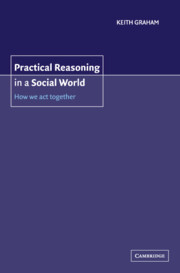Book contents
- Frontmatter
- Contents
- Preface
- Acknowledgements
- Introduction
- 1 Practical reasoning in context
- 2 The indistinctness of persons: causal interconnection
- 3 The indistinctness of persons: the personhood of collectivities
- 4 Practical collective identification and dissociation
- 5 Practical reasoning: sources and constraints
- 6 Practical reasoning and morality
- Conclusion
- Bibliography
- Index
5 - Practical reasoning: sources and constraints
Published online by Cambridge University Press: 22 September 2009
- Frontmatter
- Contents
- Preface
- Acknowledgements
- Introduction
- 1 Practical reasoning in context
- 2 The indistinctness of persons: causal interconnection
- 3 The indistinctness of persons: the personhood of collectivities
- 4 Practical collective identification and dissociation
- 5 Practical reasoning: sources and constraints
- 6 Practical reasoning and morality
- Conclusion
- Bibliography
- Index
Summary
In the previous chapter I discussed an agent's active identification with or dissociation from the different characteristics they possess. This possibility of identification or dissociation reflects the dual aspect of a reflective agent's circumstances: on the one hand, the need for active decision over whether given identifications are reasonable; on the other hand, the need to proceed from a particular set of existing characteristics in arriving at decisions. In the present chapter I attempt to increase understanding of the background against which agents might choose to identify with or dissociate from some set of properties which characterise them.
The stress in the previous chapter was on the capacity of choosing either to retain or to relinquish features which are part of an agent's identity. Some of the discussion of the present chapter should serve to remove a misleading impression which may be encouraged by that stress, namely the impression that there is an option for human agents to change everything about themselves or their circumstances. It is obvious that this is not the case and that they must operate within the constraints set by factors over which they have no control, factors which cannot be changed by them. A proper place must be found for both the sources of and the constraints on practical reasoning.
Having attempted to establish in earlier chapters the independent significance of collective agents, I here argue that there is no reason to take individual agents as in any overall sense more basic than collective ones.
- Type
- Chapter
- Information
- Practical Reasoning in a Social WorldHow We Act Together, pp. 133 - 166Publisher: Cambridge University PressPrint publication year: 2002

